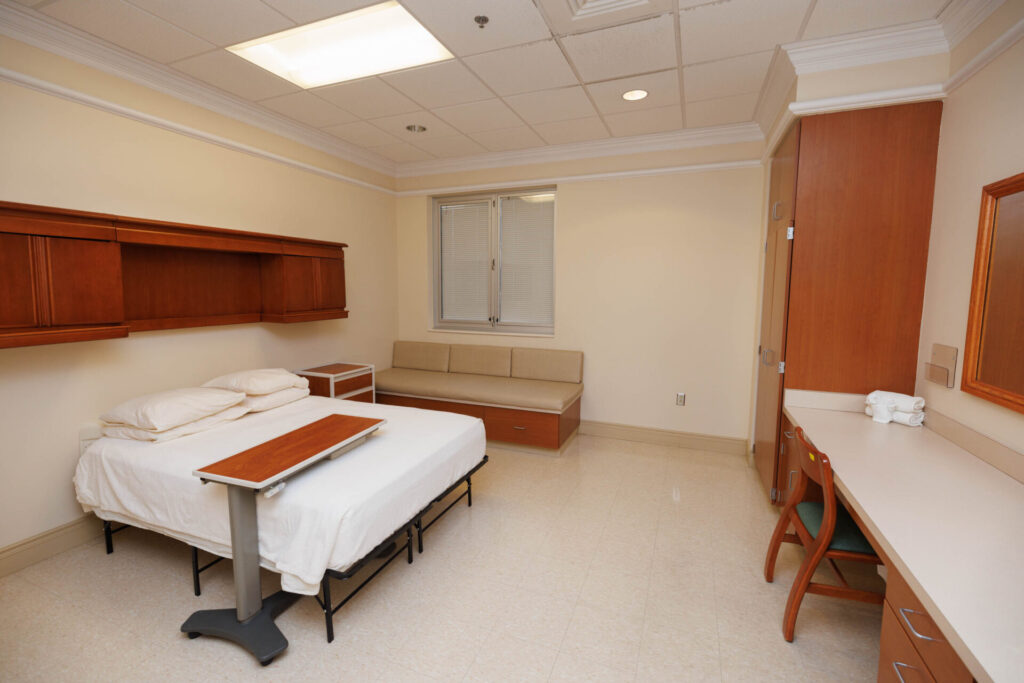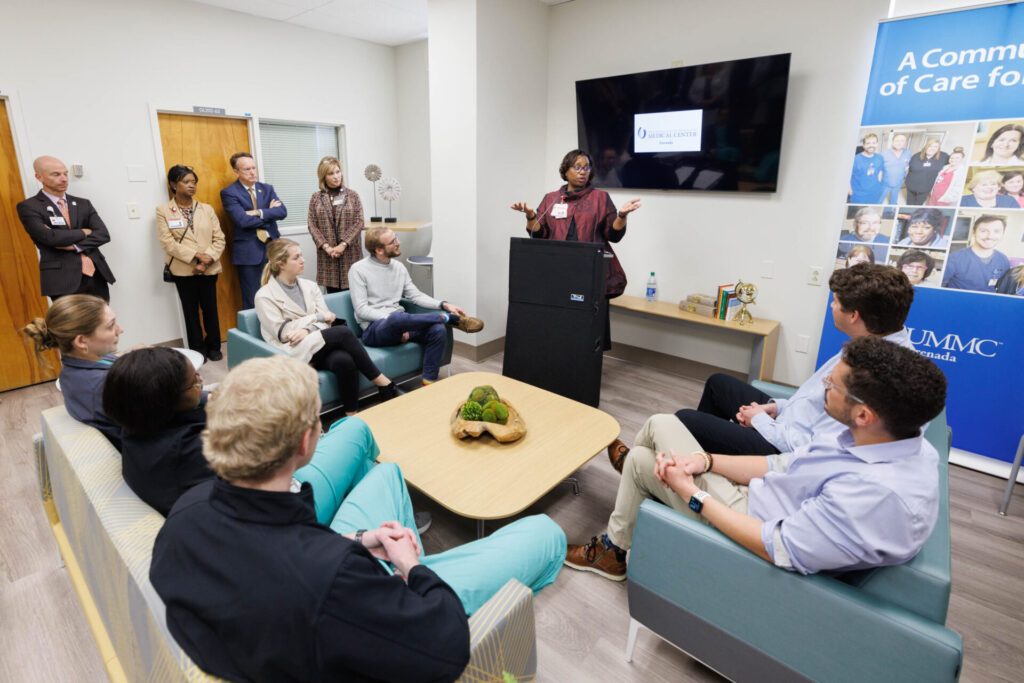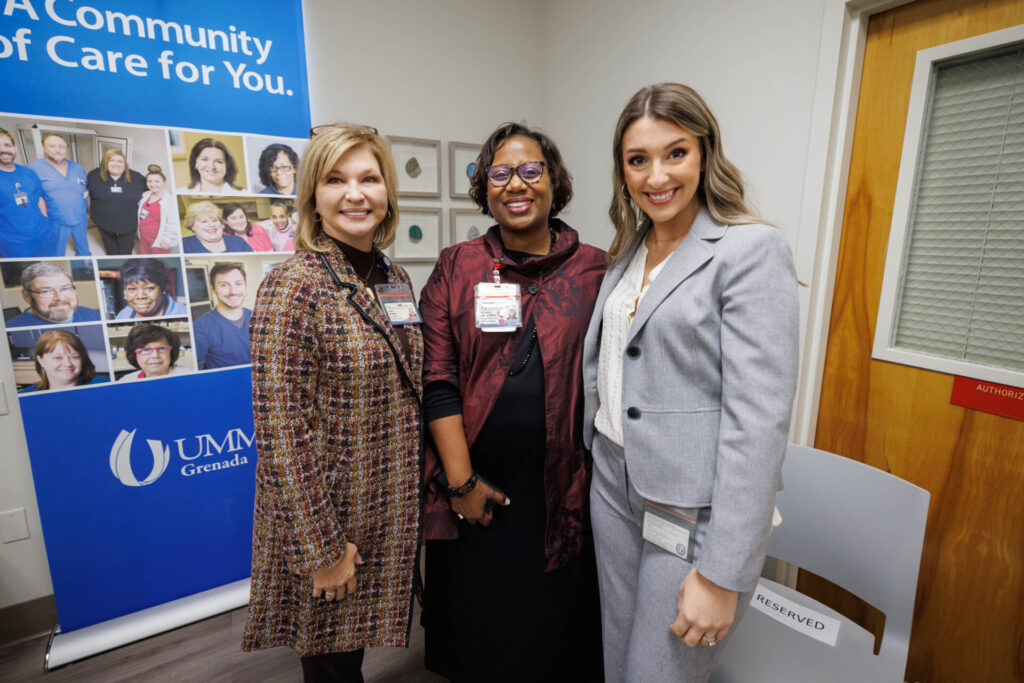Featured
New Living Space at UMMC Grenada a Boon to Medical Students on Rotation

By Ruth Cummins
UMMC communications

The summer before her third year at the University of Mississippi School of Medicine, Judi Beth Stephens trained hands-on at the elbows of physicians and surgeons at the University of Mississippi Medical Center Grenada.
It was an invaluable learning experience on the front lines of rural medicine – but it wouldn’t have happened if Stephens had to pay for her own lodging during those five weeks.
She and fellow students completing rotations at UMMC Grenada stay in unused patient rooms with private baths that are spacious and renovated to accommodate their unique needs. Upgrades to those eight rooms, in addition to refurbishing of space for a student lounge and a conference room housing computers and other learning technology, are provided through federal grant funding for the IMPACT the RACE Rural Track Program.
“For us to drive an hour and a half a day from Jackson, especially when we were on a surgery rotation, was just a little out there,” said Stephens, whose hometown is 1,121-population Mantachie in Itawamba County. “It was incredible to have the option of waking up and already being there, and not have the stress about where we would stay for such a short period.”

The four-year, multimillion-dollar grant from the Health Resources and Services Administration is giving a boost to the Medical Center’s passion for exposing medical students to the practice of rural medicine. IMPACT the RACE’s goal is to increase primary care physicians throughout rural Mississippi by providing students exemplary education, hands-on training and a taste of life in a rural community.
At $1.9 million a year, the grant is worth at least $7.6 million, not including a $5 million supplement the school is eligible for at the end of a year.
“This gives students great exposure to rural health care, and it often sparks a desire to practice in a rural setting, whether that’s surgery, primary care or another area,” said Dodie McElmurray, chief executive officer for UMMC Grenada and UMMC Holmes County in Lexington. “It lights that fire for them.”
Students rotating through UMMC Grenada are getting so much more than a convenient and comfortable place to sleep, relax and study in lieu of driving back and forth from Jackson, or paying out of pocket for a hotel room. They’re experiencing patient care one-on-one with pediatricians, orthopaedic and general surgeons, obstetrician-gynecologists and more.

“I was looking forward to working with surgeons one-on-one in Grenada,” Stephens said. “The surgeons in Grenada knew I was interested in OB-GYN, so they let me in on some of those surgeries. I got hands-on experience and got to see the team effort from everyone there.”
“The providers here enjoy this,” McElmurray said. “They’ve chosen to practice in rural medicine, and they can contribute to the next generation of physicians without working on the main campus. They can have both of those passions.”
During a Nov. 29 open house for the renovated spaces, Dr. LouAnn Woodward, UMMC vice chancellor and dean of the School of Medicine, reminded students, physicians and visitors of four numbers: 50, 4 and 100.
Mississippi is 50th nationally in physicians per capita, but fourth in retaining its School of Medicine graduates to practice in state, she said. That’s due in part to 100 percent of its students being Mississippi residents.
“These young people are so accomplished and very sophisticated. The future of health care in Mississippi looks really good,” said Woodward, a rural Carroll County native and emergency medicine physician who graduated from the School of Medicine.

Over the past two-plus years, the IMPACT the RACE grant has fueled multiple initiatives designed to boost the number of rural primary care physicians, said Dr. Loretta Jackson-Williams, vice dean of the School of Medicine and project developer for the grant.
They include creation of a statewide, rural education symposium, developing data collection to track IMPACT the RACE student participation, and outreach programs for high school and college students to spark awareness for careers in rural medicine.
“We can’t wait for them to decide,” Jackson-Williams said of future medical students. “We have to encourage their participation.”
Mississippi can claim only about 197 physicians per 100,000 population and a total of 5,857 physicians, according to American Medical Association Physician Masterfile data. In contrast, Massachusetts’ physician rate per 100,000 people is 466, with a total of 32,116 practicing statewide.
Stephens is attending medical school through an award from the Mississippi Rural Physicians Scholarship Program, serving as president of the School of Medicine’s rural medicine interest group.
Her time at UMMC Grenada was well spent – four weeks in surgery, and one in pediatrics. “You will get countless life lessons from each of the attendings,” she said. “I got to fully grasp how a rural hospital functions. I felt the sense of community you have at a rural hospital.
“And, I got to study at night, get a good night’s rest, and in the morning, go to the doctor’s lounge and have a good breakfast. I didn’t have to spend my downtime traveling to and from Jackson. Because we got to stay in Grenada, we could spend some afternoons exploring the town. It wasn’t just about the rotation.”
Stephens’ husband and high school sweetheart is second-year SOM student Cole Stephens.
“Our main goal is to be in a small town, and to pay it forward to the town where I grew up,” she said. “We definitely want to be close to family. We’re just not sure where.”
As the Medical Center strives to grow the ranks of rural physicians, Woodward said, “we’ve had such great support from all over Mississippi,” including local elected officials and members of the state Legislature.
“It’s a long pipeline, but 15 years from now, we will not be 50th in the nation in per capita physicians,” she said.









































